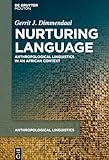Nurturing Language : Anthropological Linguistics in an African Context / Gerrit J. Dimmendaal.
Material type: TextSeries: Anthropological Linguistics [AL] ; 2Publisher: Berlin ; Boston : De Gruyter Mouton, [2022]Copyright date: ©2022Description: 1 online resource (XXVI, 382 p.)Content type:
TextSeries: Anthropological Linguistics [AL] ; 2Publisher: Berlin ; Boston : De Gruyter Mouton, [2022]Copyright date: ©2022Description: 1 online resource (XXVI, 382 p.)Content type: - 9783110727029
- 9783110727142
- 9783110726633
- 306.44096 23/eng/20230404
- online - DeGruyter
- Issued also in print.
| Item type | Current library | Call number | URL | Status | Notes | Barcode | |
|---|---|---|---|---|---|---|---|
 eBook
eBook
|
Biblioteca "Angelicum" Pont. Univ. S.Tommaso d'Aquino Nuvola online | online - DeGruyter (Browse shelf(Opens below)) | Online access | Not for loan (Accesso limitato) | Accesso per gli utenti autorizzati / Access for authorized users | (dgr)9783110726633 |
Frontmatter -- Preface -- Acknowledgements -- Contents -- List of figures -- List of pictures -- List of maps -- List of tables -- List of abbreviations -- 1 Introduction -- 2 Lexical semantics and the contribution of cognitive anthropology -- 3 Lexical semantics and the contribution of cognitive linguistics -- 4 Spatial orientation -- 5 Language and habitual thought -- 6 Onomastics -- 7 The ethnography of communication -- 8 The contribution of interactional sociolinguistics -- 9 Emotions and the sounds of silence in a cross-cultural perspective -- 10 Cultural conceptions of face -- 11 Conversation analysis -- 12 Non-verbal communication -- Appendices -- Appendix I: Kinship terminology in Tima (Schneider-Blum and Veit 2022) -- Appendix II: Colour chart as used in Tornay (1978) -- Appendix III: Politeness strategies (Brown and Levinson 1987) -- Appendix IV: Transcriptional symbols in conversation analysis -- References -- Subject index -- Language index
restricted access online access with authorization star
http://purl.org/coar/access_right/c_16ec
This monograph introduces students and scholars in linguistics, anthropology, and intercultural communication to anthropological linguistics, with a special focus on Africa. Among the topics addressed are semantic fields such as kinship or colour terminology, spatial orientation, linguistic relativity and the link between language and cognition, onomastics, the ethnography of communication, interactional sociolinguistics, emotions, (im)politeness strategies, conversation analysis, and non-verbal communication.
Issued also in print.
Mode of access: Internet via World Wide Web.
In English.
Description based on online resource; title from PDF title page (publisher's Web site, viewed 25. Jun 2024)


